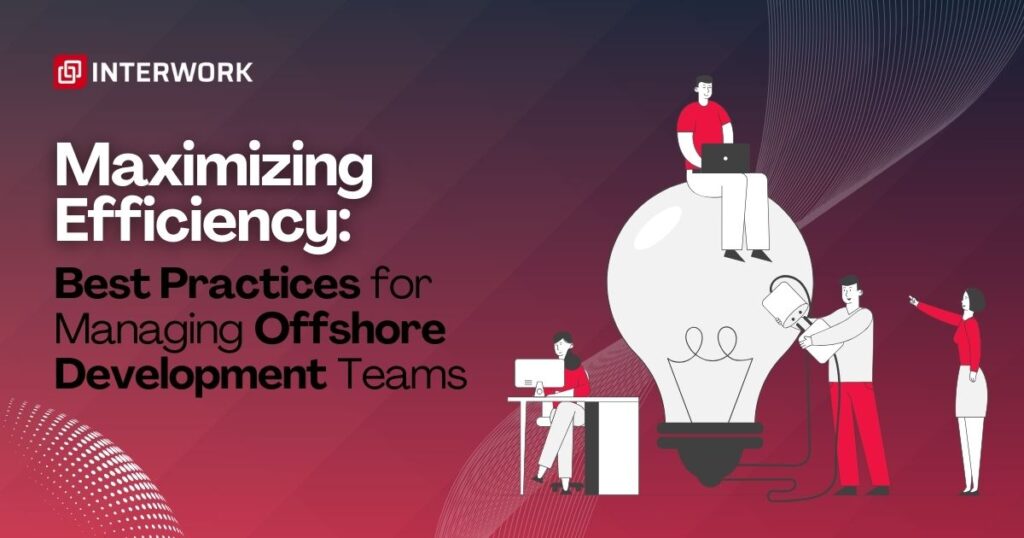Smart Manufacturing and ERP: Leveraging Industry 4.0 for Better Functionality
In the current world of dynamic industrial environment, Smart Manufacturing…
Technology partner helping businesses innovate and drive digital transformation
We understand your business better than anybody else, thanks to our domain consultants. Together with the technology experts, these domain consultants bring in years of experience to help you navigate through your technical and business challenges.
Interwork’s exclusive product approach is the cornerstone for all software engineering services that help build and design digital products using industry standards and enterprise agility frameworks. Our product strategy and management solutions, cross-channel mobile apps, DevOps transformation, and agile practices help businesses team up with us.
Embracing digital technology has never been more critical. In an era where technology is breaking down age-old barriers, businesses must create digital experiences that are consistent and connected. Our Nexgen services will enable you to win your customers’ and employees’ loyalty and trust in an environment of digital information proliferation.
Businesses can get an integrated environment with IoT, business processes, and IT consulting. Digital solutions help increase efficiency and simplify operations. Our role as a digital solution provider is to provide customers with bespoke digital experiences that enhance customer retention and open up new business prospects. At Interwork, we deliver cutting-edge services to businesses using the latest tech.
No matter where your apps exist, whether your own servers, third-party clouds, or a mix of both, we’re your one-stop cloud service provider. We can help you upgrade and migrate your apps without a hitch. As part of our cloud services, we make it easy for you to move to the cloud of your choice and keep your apps running smoothly.
You can create an omnichannel experience by connecting all your touchpoints, devices, and channels. Interwork’s strategy and UX team use the latest technology tools to develop intuitive and specific solutions for each client. A good UX design involves collaboration and iteration. We aim to make digital experiences fun and useful for clients and users.
Interwork’s end-to-end quality assurance and testing services helps enterprises manage an increasingly complex technology landscape through various solutions. Our quality assurance practices have enabled global enterprises to gain consistency, improve productivity, lower costs, and boost profits. With the help of our quality assurance frameworks, practices, and solutions, we help our clients mitigate technical and business risks.
Interwork believes that providing the target audience with a superior product or service will positively impact them. Therefore, Interwork helps startups refine their product ideas. We use technology-driven accelerators, business models, skilled resources, standardized processes, and profound experience to help startups visualize, conceptualize and execute their business requirements, turning them into profitable ventures.
No matter how well you care for your software, technical errors, system failures, faults will always occur. When that happens, don’t let it sabotage your productivity or impact your business. Reach out to us, with Interwork’s help desk and operations support offerings, we walk that extra mile to make sure your business runs 24X7.
You need the right team and the right skill set for your project to succeed. With Interwork’s IT Staffing Services, you can hire qualified and experienced resources quickly ramp up your application development initiatives. Whether you need a prototype or a full-scale enterprise app, we’ve covered you.
Interwork’s exclusive product approach is the cornerstone for all software engineering services that help build and design digital products using industry standards and enterprise agility frameworks. Our product strategy and management solutions, cross-channel mobile apps, DevOps transformation, and agile practices help businesses team up with us.
Embracing digital technology has never been more critical. In an era where technology is breaking down age-old barriers, businesses must create digital experiences that are consistent and connected. Our Nexgen services will enable you to win your customers’ and employees’ loyalty and trust in an environment of digital information proliferation.
Businesses can get an integrated environment with IoT, business processes, and IT consulting. Digital solutions help increase efficiency and simplify operations. Our role as a digital solution provider is to provide customers with bespoke digital experiences that enhance customer retention and open up new business prospects. At Interwork, we deliver cutting-edge services to businesses using the latest tech.
No matter where your apps exist, whether your own servers, third-party clouds, or a mix of both, we’re your one-stop cloud service provider. We can help you upgrade and migrate your apps without a hitch. As part of our cloud services, we make it easy for you to move to the cloud of your choice and keep your apps running smoothly.
You can create an omnichannel experience by connecting all your touchpoints, devices, and channels. Interwork’s strategy and UX team use the latest technology tools to develop intuitive and specific solutions for each client. A good UX design involves collaboration and iteration. We aim to make digital experiences fun and useful for clients and users.
Interwork’s end-to-end quality assurance and testing services helps enterprises manage an increasingly complex technology landscape through various solutions. Our quality assurance practices have enabled global enterprises to gain consistency, improve productivity, lower costs, and boost profits. With the help of our quality assurance frameworks, practices, and solutions, we help our clients mitigate technical and business risks.
Interwork believes that providing the target audience with a superior product or service will positively impact them. Therefore, Interwork helps startups refine their product ideas. We use technology-driven accelerators, business models, skilled resources, standardized processes, and profound experience to help startups visualize, conceptualize and execute their business requirements, turning them into profitable ventures.
No matter how well you care for your software, technical errors, system failures, faults will always occur. When that happens, don’t let it sabotage your productivity or impact your business. Reach out to us, with Interwork’s help desk and operations support offerings, we walk that extra mile to make sure your business runs 24X7.
You need the right team and the right skill set for your project to succeed. With Interwork’s IT Staffing Services, you can hire qualified and experienced resources quickly ramp up your application development initiatives. Whether you need a prototype or a full-scale enterprise app, we’ve covered you.



In the current world of dynamic industrial environment, Smart Manufacturing…
In today’s milieu of industrial evolution, integrating modern technologies has…
In the era following the Fourth Industrial Revolution, Industry 4.0…
In the rapidly evolving landscape of manufacturing and technology, Industry 4.0…

Offshore development teams offer cost savings and efficiency, but managing them requires unique skills. In this article, we explore essential strategies for success, including clear communication, team culture, talent selection, realistic expectations, and project management tools. We also provide insights on overcoming common challenges like time zone differences and cultural barriers. Implementing these strategies can lead to efficient collaboration, improved productivity, and successful outcomes.
Clear and effective communication is the cornerstone of the successful management of offshore development teams.
By implementing these communication best practices, you can overcome communication barriers and establish a strong foundation for effective collaboration with your offshore development team.
Setting clear goals and expectations is essential for maximizing efficiency when working with offshore development teams.
By breaking down tasks, establishing clear goals, and tracking progress, you can ensure your offshore development team is aligned with your project objectives and working towards desired outcomes.
Creating a strong team culture is vital for fostering collaboration, motivation, and a sense of belonging among offshore development teams.
Effective project management is crucial for maximizing efficiency when working with offshore development teams.
To manage offshore development teams successfully, businesses must embrace effective communication, clear goal-setting, team-building, and project management tools. By implementing these best practices and combining technical expertise, cultural understanding, and effective leadership, businesses can maximize efficiency, deliver quality software projects, and gain a competitive advantage in the global market. Start implementing these best practices today to unlock the full potential of your offshore teams.